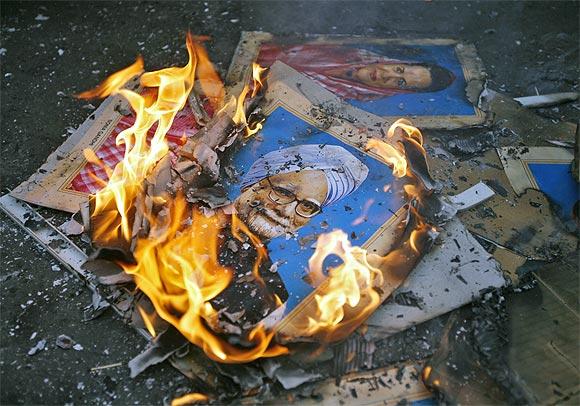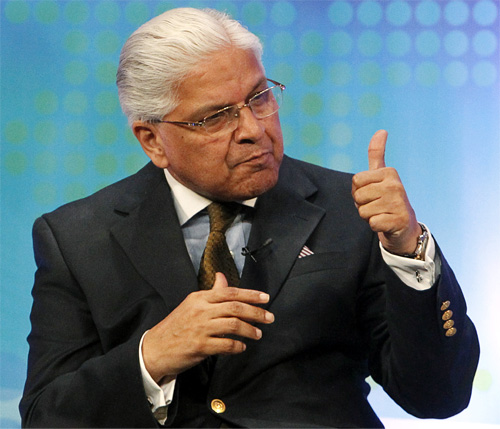 | « Back to article | Print this article |
Oppn can't attack PM for BOTH coal-gate and 2G scam
If the PM had just chosen to behave as if there wasn't anything wrong about existing systems, he wouldn't have been in such trouble today, says Mihir S Sharma
There is much that the two major scandals convulsing Parliament have in common. The scandal surrounding the allocation of 2G spectrum by Andimuthu Raja's ministry and the one about coal block allocation at around the same time, by the coal ministry headed then by Prime Minister Manmohan Singh, have, for one, similarly enormous presumptive losses, if you are credulous enough to believe the Comptroller and Auditor General on the subject.
They both centre on the United Progressive Alliance handing out natural resources at a below-market price to producers. They both could be, and were at the time, sold as the natural continuation of an existing and generally accepted policy.
Most importantly, they have -- politically -- an identical salience today for the Opposition. They are both ways to get at Dr Singh, who continues to somehow drift above his government's reputation for venality. In one case, he is seen to have allowed Raja to play games with first-come-first-serve allocations; in the other, a ministry he happened to have additional charge of at the time was overseeing the handout of coal mines, some of them to extremely doubtful applicants.
The darkly amusing thing about all this is, in fact, that the only handle the attack on the prime minister's conduct really has was that he seemed to think there was something wrong with the process in both cases.
Click on NEXT for more...
Oppn can't attack PM for BOTH coal-gate and 2G scam
In 2G, the only thing connecting him to the problem is the series of letters he wrote to successive telecom ministers trying to get them to change what he saw as faulty processes; in coal mine allocations, the sole sad little fig leaf of an excuse that the CAG could find to write an "audit" report in the first place was that, when he first took office in 2004, Dr Singh had indicated that he wanted to move to an auction system for mines.
In fact, if the prime minister had just chosen to behave as if there wasn't anything wrong or 'manipulable' about existing systems, he wouldn't have been in such trouble today.
Oddly, nobody is pausing to think what incentives this creates for a future, perhaps less scrupulous executive.
There's an important point of difference, too, between the misbehaviour being alleged in the two scandals; one that gets to the heart of a peculiar tension between two words that are thrown around thoughtlessly a lot -- "leadership" and "institutions".
Remember, the current fracas over coal block allocations is essentially over the fact that Law Minister Ashwani Kumar -- generally seen as the prime minister's man -- asked the Central Bureau of Investigation for its probe report into coal. (It was also shared with officials in the coal ministry and the Prime Minister's Office, but the sequence of events is unclear.)
We are all, of course, shocked, shocked that the CBI is not completely independent of the political executive that controls it. That being said, there is little doubt that it is supposedly so, and the executive demanding to read a report that investigates its own decisions further undermines an already weak institution.
The fact that the CBI was not reporting on its investigation into possible criminality and conspiracy, but on the theoretical nature of coal block allocation policy, at the orders of the Supreme Court -- something I don't think it is competent to do, and something the Court should definitely not be asking about in the first place -- is irrelevant, though that perhaps fed into the executive's decision.
But that's a giant problem in India today: independent institutions don't always act with complete good sense, but you have to respect them anyway -- though true "leaders" might not want to.
In this case, the disrespect for institutional independence is certainly sufficient, in my opinion, for the law minister's resignation to be expected, and for an apology from the prime minister, at the least.
Click on NEXT for more...
Oppn can't attack PM for BOTH coal-gate and 2G scam
In the 2G case, by contrast, the problem apparently is that the prime minister, in spite of his clearly expressed misgivings, chose to accept that the telecom ministry had ultimate control over implementing a policy duly decided by the Cabinet. Here, apparently, he didn't show leadership, since he didn't overrule various competent authorities.
Do you see the incoherence here? Either we accept that the prime minister should show greater respect for "institutions", and shouldn't be interfering in things that are nominally independent of day-to-day control, like ministries or the CBI.
Or he should show greater "leadership", and not let institutional lines drawn on meaningless little bits of paper get in his way.
The only way you can claim consistency is to pretend then that, somehow, the Union Cabinet is little more than the prime minister's secretariat, and in charge of doing only what he tells them to do. Certainly, that's how "leaders" like Indira Gandhi operated within the Westminster system.
So it continues to amuse me how hard the promoters of "institutions" have to struggle to not see how overruling a ministry undermines the institution of the Cabinet.
Either way, the prime minister is in the wrong on something. That's not my point -- my point is that you can oppose his conduct on one or on the other. Not both, if you wish to claim you're standing on principles.
This unprincipled incoherence can have real effects. After nine years of Dr Singh, we are told that India longs for a strong leader. Possibly.
But I think what we actually need is greater respect for independent institutions. The first does not get you the second -- quite the reverse. Liberals should always prefer the second -- and in this environment, if you're calling for the first, you're not liberal at all.
Click on NEXT for more...
TOP photo features of the week
Click on MORE to see another set of PHOTO features...




